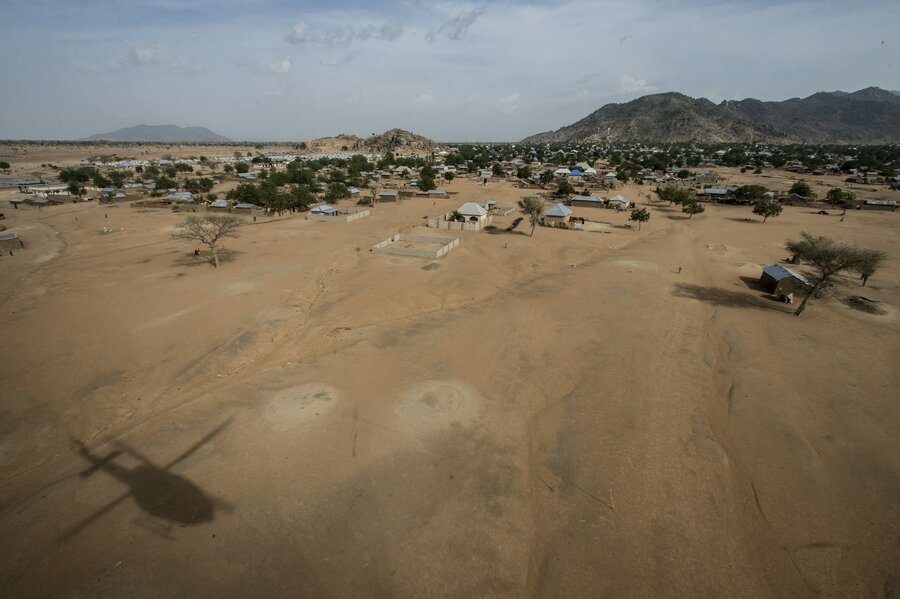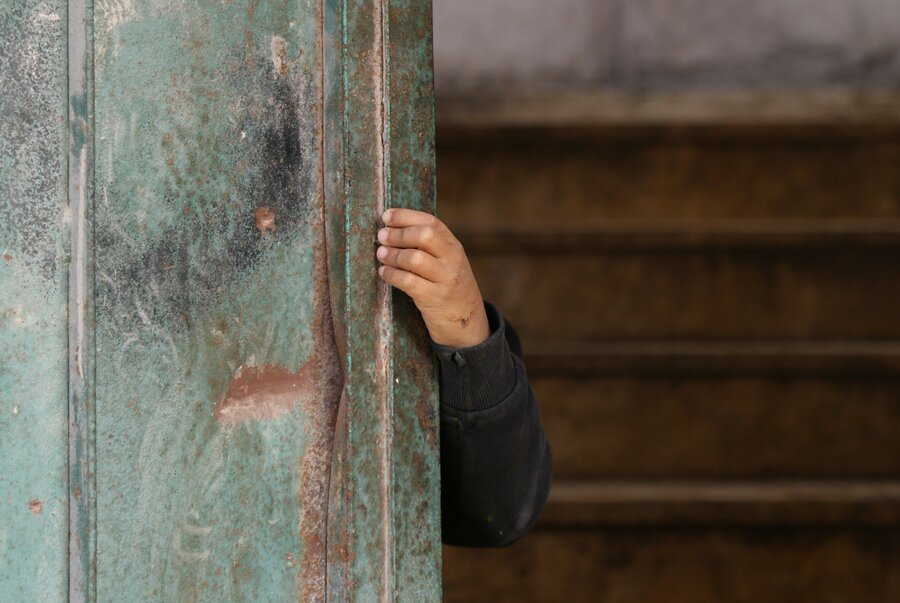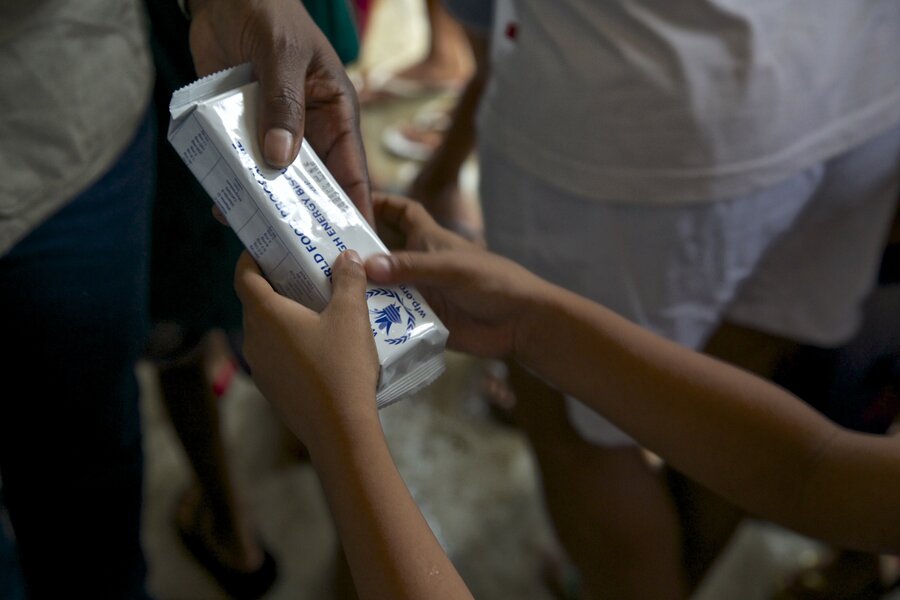The good, the bad and sometimes ugly
When a conflict erupts or a natural disaster strikes, the World Food Programme (WFP) is on the front line, providing food and nutrition assistance. Six aid workers reveal their biggest challenges and toughest takeaways on responding to complex humanitarian crises — in five questions.

An emergency hits. A team comes together. What does it take for you to get a crisis response up and running?
The Programme Officer: What happened? Where? How many people have been impacted? What type of assistance will be needed and for how long? The answers to these five key questions give us an understanding of the scale and severity of a crisis and ultimately, help shape our aid operation. Concerns on how the response will be funded are never very far behind.
The Economist: We need information and we need it fast. Once the situation is stabilized, we monitor agriculture, climate, exchange rates, markets — basically, every factor that can affect the availability of food or people's access to it. Now that we have drones, cell phones and satellites, we no longer have "dark spots" in data; technology lets us get more information than ever before. Today, we can even get information out of besieged areas.
The Communications Officer: To prepare for any scenario, we need to understand events as they unfold. Monitoring the media is critical. We keep close contact with programme so we know what relief response is being planned and where the most urgent needs are. We also work a lot with supply chain to get access to the field, and collect content that shows our response.
The Supply Chain Officer: When we send trucks to an emergency, efficient and proper vehicle management is crucial. It is important for my team to allocate the right resources to the right people. Preparedness is the key here, so that when an emergency strikes, all available resources are maximized. We work with other units in the supply chain division like shipping and procurement to make sure all the steps are done on a timely basis.
The Nutritionist: It requires a lot of multitasking and coordination in addition to an ability to adapt to fast-changing information. We use technical knowledge to assess needs and design nutrition programmes and diplomacy to discuss with the government and partners on how to best complement our efforts. It is also necessary to identify and train partners who can implement nutrition activities, and for us to visit the affected areas.
The Chief Medical Officer: We gather public health information, especially on preventable health issues, at the location of the emergency response. Our field- based regional medical officer conducts an assessment of the local health infrastructure — this can range from locally-run hospitals or clinics to those run by NGOs or the private sector. We prepare the required vaccines and emergency medical kit, and identify where these resources are available in the field. Our goal is to ensure that staff are physically healthy and psychologically prepared to go into an emergency response, and that they stay that way while they are on the ground.

No job comes without its challenges. What are some of the difficulties you are up against?
The Programme Officer: We are trying to be more long-term and strategic in how we respond to food security and nutrition needs. A natural disaster response is a prime example. We encourage government to take the lead but because we have resources like technical knowledge that the government might not necessarily have at their disposal, we sometimes do.
The Economist: You go into the field and hear and see the problems. You know what needs to be done, and you even see the solution. You do all the right analyses. You take your findings to the people who can make a difference — and then you are faced with a funding shortfall.
The Communications Officer: Unfortunately, with everything going on in the world, the bombardment of information on mainstream media, and the new age of social media, we now have to work harder to present our stories and reach our audience.
The Supply Chain Officer: Sometimes it is difficult for us humanitarian space newcomers to find our place, especially in an emergency context where both the stakes and tensions are high.
The Nutritionist: In the initial stages of an emergency, it is often difficult to get information on the nutrition situation and this makes planning difficult. It can also be very hard to get specialized nutritious foods to where we need it quickly, as road conditions can be poor and access can be challenging.
The Chief Medical Officer: I am always concerned about the medical infrastructure in places where we operate. It is important to make sure people are healthy before they deploy for an assignment. We also do first-aid training to teach staff what to do if they hurt themselves or if others are injured.

What is it about your job that keeps you up at night?
The Programme Officer: As we try to transition from being a humanitarian actor addressing people's needs to one focused on implementation and empowering people to access livelihoods, we will need different skills to make food assistance a thing of the past. The question then becomes whether we are matching our capacities to our objectives?
The Economist: Globalization, that old buzzword. The poorest of the poor are going to be less productive as a direct result of poor nutrition. Children will not grow up to be healthy and productive adults, able to reach their full potential. And yet, they will have to live in the same globalized world.
The Communications Officer: Trying to be human in the face of profound inhumanity. When I talk to people and learn about their struggles and their loss, I feel emotions that any human would feel: anger, incredulity, despair. I have learned that these emotions allow us to relate to those we are trying to help. I could have been in the shoes of any one of these people if not for accidental luck of the draw we call birth. I try to capture this in my stories so that readers can see themselves in the people whose stories we are sharing, and perhaps feel motivated to help by donating.
The Supply Chain Officer: I train a lot of staff in the field on how to use tools that help monitor the cost performance of vehicles. I often wonder if the training will be helpful for colleagues in the long term too?
The Nutritionist: Any unexpected delay causes me to worry. The reason is simple: any issue with food deliveries or partner agreements could delay people from receiving nutrition assistance.
The Chief Medical Officer: Medical evacuations. We have a staff of 16,000 people serving in some of the most remote areas of the world. When people are acutely ill or there is an illness that cannot be addressed locally, we need to find a nearby facility, and it is not always easy. Visa requirements can restrict people's ability to access a health facility in another country, and even a medical emergency cannot trump that.

Share an experience from an emergency that left its mark on you.
The Programme Officer: Abyei, Sudan, 2008. We were in the middle of two warring parties and trying to be in a neutral space. After we resettled 100,000 people, we were under artillery shelling for eight hours straight. While many of us were evacuated to Khartoum by helicopter, some of the national staff ran into the bush. A few days later, some of us were flown back into Abyei to evaluate the situation, and I was one of them. Many of the people I came across there were people I already knew. Family members of national staff. Shopkeepers. It was hard because suddenly, a "pipeline break" was not a pipeline break anymore; it became a personal effort and you felt a strong responsibility. It took me a long time to process the entire experience.
The Economist: I was on mission in Darfur with a couple of colleagues. Our vehicle was stopped. Panic. Our hands all went up, slowly. More panic. We were let go. Sometimes I wonder whether if that would have happened today, would we have been so lucky? I am not so sure.
The Communications Officer: I will never forget entering Douma on 15 March of this year, the day that marked the start of the Syrian uprising seven long years ago. Everyone inside the besieged city, both young and old, were begging me and my colleagues to take them out. Food was the last thing on their mind; escape was what they wanted. No words of comfort would soothe the people stuck inside Douma and it broke my heart to see the limits of our humanitarian mission.
The Supply Chain Officer: I was in the Central African Republic recently, when the security situation took a turn for the worse. At one point, we could not leave our accommodations because it was not safe for us to go outside. I was worried about many things.
The Nutritionist: I was working with the French Red Cross in Agadez in the north of Niger in 2009. One day, the town and surrounding area experienced an unprecedented amount of rainfall which led to severe flooding. I remember waking up in the morning seeing water flowing down the street like a river. The rain caused so much devastation; thousands were affected and many lost their homes. Even though we did not have power for a few days, we had to ramp our nutrition activities. I saw first-hand how a single event like a natural disaster can be catastrophic in fragile settings.
The Chief Medical Officer: The 2014 Ebola response. There were so many challenges to dealing with the unprecedented crisis. You see the virus in textbooks but tangible experience? Very few medical professionals have had that when it comes to the virus. When there was a suspected case in headquarters, we needed to assuage staff but we were also responsible for keeping the channels of communication open with the city of Rome, the Ministry of Health, and other structures of the host government. We had to rethink our procedures and protocols.

So then, what are your final thoughts? Pick your plug.
The Programme Officer: We need to stop seeing emergencies as one-off occurrences. The volatility of weather patterns, increased temperatures and rainfall, the impact of climate change on food security, and the competition for resources will drive conflict, and conflict will drive hunger.
The Economist: The bottom line is that today we can see and hear more through our digital eyes, and that raises the question of can we do more? Today's analytical problem is not that we do not have enough information but how do you make it operationally meaningful?
The Communications Officer: Visiting cities across Syria and seeing them destroyed is heartbreaking because with their loss went peoples' homes, livelihoods and histories. It pains me to see our common heritage in ruins. The ubiquitous destruction is overwhelming and speaks volumes about the failure of the international community to stop the senseless violence that has ruined lives and the social fabric of a beautiful people.
The Supply Chain Officer: Tackling challenges is part of WFP's DNA, and mine too. It is remarkable to work for an organization with so many passionate colleagues who often go to incredible lengths to help people.
The Nutritionist: My interest in nutrition — and motivation — stems from a belief that everyone has the right to good nutrition. This must be protected and supported, especially during emergency situations or crises.
The Chief Medical Officer: Despite the challenges, emergencies can lead to some of the best teamwork. Equipped with lessons learned from past experiences, we are ready to get an emergency response going wherever, whenever.
A special thanks to the people behind their WFP titles — Programme Officer Brian Bogart, Chief Economist Arif Husain, Communications Officer Marwa Awad, Supply Chain Officer Mathilde Wateau, Nutritionist Diane Ashley, and Chief Medical Officer Yimei Cao — for their willingness to be interviewed for this article.
As the Regional Programme Officer for WFP's Southern Africa bureau, Brian is responsible for supporting programme design and implementation in 11 countries. He joined as a Congressional Hunger Fellow in Cambodia in 2005. Since then, his work has taken him across Southern Africa, Sudan, South Sudan, Kenya, New York, and WFP Headquarters in Rome, Italy.
Chief Economist and Deputy Director of the Food Security Analysis and Trends, or Arif as he is widely known at WFP, analyzes factors that impact food security in developing countries. Globalization, technology, migration — his areas of interest and research span many topics. Before coming to WFP, Arif worked at the World Bank. He has a Ph.D. in agricultural and applied economics. He was recently on mission to Nigeria and Syria.
Before joining WFP in 2014, Marwa was a Reuters correspondent and wrote for the Guardian. She covered the Arab Spring in Egypt and later traveled across the region. She has worked for WFP in the Iraq and Syria crises.
Mathilde first joined WFP as an intern on the Global Fleet Team, the branch of WFP Logistics that maintains emergency transport capacity. Today, her main focus is "Fleetwave," WFP's Fleet Management System (FMS) used by offices in the field to monitor cost performance. She has been on mission to Djibouti, Burundi and Central African Republic.
Ask Diane why she works for WFP and the answer is simple: the organization is one of the only actors able to respond at scale to a nutrition crisis, providing humanitarian assistance when it is most needed. Diane has worked as a Nutritionist in Niger, Mauritania, Burkina Faso, Lao PDR, Democratic Republic of Congo (DRC) and Chad. She holds a BSc in Nutrition and Dietetics and a MSc in Public Health Nutrition.
A medical doctor whose specialty is Internal Medicine, Yimei now focuses on occupational medicine. She joined WFP's Medical Service in 2013. Her most recent mission was to the Somali region of Ethiopia, where she assessed local health and medical infrastructure available to WFP staff.
Learn more about how WFP is saving lives and changing lives.

